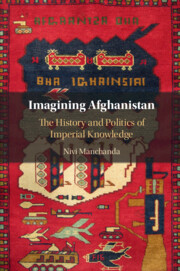Book contents
- Imagining Afghanistan
- Imagining Afghanistan
- Copyright page
- Dedication
- Epigraph
- Contents
- Figures
- Acknowledgements
- Introduction
- 1 The Construction of Afghanistan as a ‘Discursive Regime’
- 2 A Space Contested, or the ‘State’ of Afghanistan
- 3 The Emergency Episteme of the ‘Tribe’ in Afghanistan
- 4 Framed
- 5 Subversive Identities
- Coda
- References
- Index
3 - The Emergency Episteme of the ‘Tribe’ in Afghanistan
Published online by Cambridge University Press: 09 June 2020
- Imagining Afghanistan
- Imagining Afghanistan
- Copyright page
- Dedication
- Epigraph
- Contents
- Figures
- Acknowledgements
- Introduction
- 1 The Construction of Afghanistan as a ‘Discursive Regime’
- 2 A Space Contested, or the ‘State’ of Afghanistan
- 3 The Emergency Episteme of the ‘Tribe’ in Afghanistan
- 4 Framed
- 5 Subversive Identities
- Coda
- References
- Index
Summary
The notion of the ‘tribe’ is perhaps the most (ab)used socio-political category when it comes to contemporary political discourse on Afghanistan. Following on from the alternate construction of Afghanistan as a failed state, as a frontier and from debates about ‘Af-Pak’, Chapter 3 shows the ways in which a particular lens through which the early East India Company administrators tried to comprehend the people they encountered has become a definitive marker of Afghan society, polity and culture today. The discussion traces the genealogy of the term ‘tribe’ before moving on to an examination of the problematic knowledge practices that underpin this over-determined and misleading Afghan ‘way of life’.
- Type
- Chapter
- Information
- Imagining AfghanistanThe History and Politics of Imperial Knowledge, pp. 105 - 142Publisher: Cambridge University PressPrint publication year: 2020

